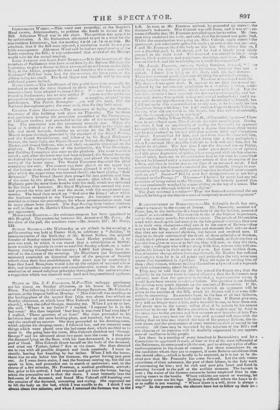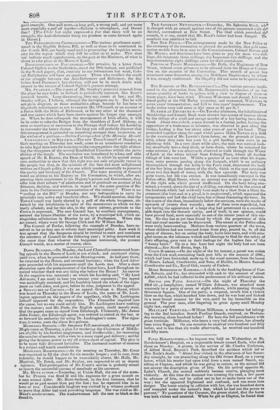REPRESENTATION of Donsrrsmere—Mr. Calcrafes death has °CCP.; skated a vacancy
in the county of Dorset. Mr. Ponsonbv' member ft r Pooie. has, by the invitation of a large body of the freeholders, presented himself as a candidate. The occasion is one of the highest importance, mit to the county merely, but to the country. The people of Dorsetshire acted with much spirit and energy in the late general election ; they owe it to their own characters—they owe it to the cause of Reform—they owe it to the King, who still requires and demands their aid—to show that they are not wayward children, but honest and resolved men. If they be as deeply convinced of the truth of those principles of freedom, which their present member has so often vindicated, as their conduct at last election gives us reason to believe, they will now, as they did then, give him a colleague who will act along with him, not one who will neu- tralize his labours in their service amours. Let them bethink them, that whatever change others have experienced, Mr. Bankes has suffered no change ; that he is in all points and particulars the very same man whom they repudiated in April last. They did right in turning him off then ; they cannot, without =kiln; themselves a byword and a reproach to their countrymen, admit him now.
They may he told that the Bill has passed the Commons ; that the majority in its favour there is beyond dispute ; that the llcfotiners may tolerate, now that the question is decided, a representative whom it would have been unwise to tolerate before. The question is not decided. Its decision very much depends on the conduct of Ddrsetshire. If Mr. Bankes, or if any Anti-Reformer be returned, an argument will be given to the enemies of the Bill, which its friends trill find same diffi- culty in answering. Its enemies have, in the face of all fact hitherto, maintained that the country had cooled to Reform. If Dorset give way, they will no longer want a fact, and a tiormidable one, to bear them out. Let every man in the county reflect that if he refrain by his utmost exertions to favour the Reform candidate, his neglect may be fatal in the mean time to the greatest and best measure ever introduced into Par. liament. Let every man use his vote and parsonal infleence with the feeling that on him may depend the fate of the present. Reform, the fu- ture peace, and the permanence of every institution civil or sacred in the country. All these may be hazarded by the rejection of the Bill ; and the chances of its rejection will be fearfully augmented by any appear. once of vacillation in the people.
Let there be a meeting of every hundred in Dorsetshire ; and let a . Committee be appointed in each, of four or five of Om most influential of the Reformers, to correspond with the rest, and to arrange a plan of effec- tual cooperation in the event of contest. Let these committees fix on the candidate whom they are to support, if more Reform candidates than one should offer,—which is hardly to be expected, as it is not to be de. sired now that Mr. Ponsonby has come forward. Let the rich voters contribute of their substance, the poor of their labour, in the holy work of canvassing for him ; and let rich and poor join heart and hand in pressing forward to the poll at the earliest moment. The harVest is over ; the wains of the farmers cannot be better employed than in con- veying voters to the booths. Where vehicles are scarce or wanting, let the sturdy voter use his legs. Nothing is difficult where the heart to do or to suffer is not wanting. " Where there is a will, there is always a way." In the present case, the electors have but to follow up their otra
good example. One pull more—a long pull, a strong pull, and yet more more especially a pull all together—Reform is triumphant, and Dorset free ! [The Globe last night expressed a fear that there will be no struggle, the Anti-Reformers being too prudent to come forward again in Dorset.] Tim PARLIAMENTARY Con3IIsstosEms.—The various gentlemen nomi-
nated in the English Reform Bill, as well as those to be nominated in the Scotch Bill, are busily employed in prosecuting the inquiries neces- sary for the report which they will be called on to make. This does not indicate much apprehension, on the part of the Ministers, of what is about to take place in the House of Lords.
REPRESENTATION OP FURFAIISRIRE.—We perceive, by a letter from
Colonel Ogilvie to the freeholders, dated the 10th instant, and published in the Scotch papers, that, contrary to our information last week, Colo- nel Hallyburton will have an opponent. Those who recollect the result of the struggle between the Anti-Reformers and Reformers, the day before Lord Panmure's last election, will not be in much doubt with respect to the success of Colonel Ogilvie's present attempt.
STANLEY.—The report of Mr. Stanley's projected removal from the place he now holds in Ireland, is periodically repeated, like Kean's farewell benefit. Long threatening, they say, comes A last ; and Mr. Stanley will go, I believe, although the newspapers say it. But he will not go in disgrace, as those authorities allege, because he has been so singularly unfortunate as not to content Mr. O'Connell, or on account of a fracas with the Duke of Richmond, or for any other of the thousand and one causes which have been shown against his longer stay amongst us. When he does relinquish the management of Irish affairs, it will be in order to take the Budget from the shoulders of Lord Althorp, as soon as weariness or succession to the Peerage shall induce his Lordship to surrender the heavy charge. Ere long you will probably discover that this arrangement is grounded on something stronger than conjecture, or the wishes of a partisan.—Dublin Corrrspondent of the Morning Herald. CONSISTENCY IN REFORM.—The new Town-Council of Dundee, at
their meeting on Thursday last week, came to an unanimous resolution to take legal measures for restoring to the congregations the right of elect- ing the clergymen of the several Established Churches within the juris- diction of the burgh. The resolution was introduced by a long and able speech of Mr. E. Baxter, the Dean of Guild, in which he quoted nume- rous authorities to show that this right was not only originally vested in the people, but that, in the opinions of the best and most enlightened writers on Church polity, it was one which tended essentially to preserve the purity and harmony of the Church. The same meeting of Council voted an address to his Majesty on his Coronation, in which, after ex- pressing their attachment to his Majesty's person and Government, they offer him their tribute "of admiration and of gratitude on account of his firmness, decision, and wisdom, in regard to the great question of Re- form in the Parliamentary representation of the country." There is no "cooling to the Bill" at Dundee, nor any indisposition to carry its principles into active and beneficial effect. We should mention, that the Town-Council was lately elected by a poll of the whole burgesses, ob- tained by the inhabitants in spite of the manoeuvres to which we for- merly alluded; and for this also, in the above address, gratitude to the Crown is expressed. The new Council has, by excellent management, secured the future liberties of the town, by a municipal bill, which ex- tinguishes self-election in Dundee by act of Parliament. When this act passed, where were Sir George Clerk and Sir William Rae ? The Council of Forfar, following the example of Dundee, have re- solved as far as they can to reform their municipal polity. Last week it was agreed that the burgesses should be invited to meet and nominate the members of Council for the following year ; it being determined at the same time that whoever the burgesses nominated, the present Council would, as a matter of course, elect.



























 Previous page
Previous page